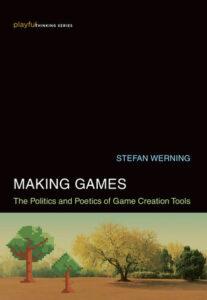dr. Stefan Werning
Stefan Werning is an Associate Professor for Digital Media and Game Studies at Utrecht University, where he co-coordinates the focus area Game Research and organizes the annual summer school Multidisciplinary Game Research.

Ecogame Playtesting Series 2024/25
In September 2024, the Network for Environmental Humanities (NEH) and the Utrecht Game Lab are launching a new series of events playtesting and discussing ‘ecogames’: or games that engage with the environment and with the climate crisis.

“Hacking Board Games” Workshop at RMeS 2024 Summer School
Concluding the RMeS Summer School 2024: Environmental Media, Laura op de Beke and Stefan Werning of the Utrecht Game Lab organised a workshop for RMA students to facilitate ecological thinking by redesigning (or: ‘hacking’) board games.

Franchise Hacking – Magic: the Gathering
'Franchise hacking’ within Magic: The Gathering (MtG) means to creatively alter game elements to embed urgent real-world ecological narratives into the game’s design.

STRATEGIES: Sustainable Transition for Europe’s Game Industries
Learn everything you need to know about STRATEGIES , the recently started research project, spearheaded by Utrecht University.

Ecogames: Playful Perspectives on the Climate Crisis
Ecogames: Playful Perspectives on the Climate Crisis brings together authors who explore the aspects of ecocritical engagement in and through games.

Spationomy 2.0
The Spationomy 2.0 project was started in October of 2019, and concluded with a final conference held in November of 2022. The project was funded by the Erasmus+ program of the European Union.

Ecomodding: Understanding and Communicating the Climate Crisis by Co-Creating Commercial Video Games
This article explores how the climate crisis and specifically the underlying “crisis of the imagination” (Bendor 2018, 132) exacerbate the entrenchment of environmental communication, and how modifying commercial video games (ecomodding) can facilitate the use of games as effective communication infrastructures to address this issue. Environmental communication challenges are well-studied, but remain difficult to tackle in practice.

Taking Playful Scholarship Seriously: Discursive Game Design as a Means of Tackling Intractable Controversies
The article at hand explores the concept of playful scholarship, focusing specifically on the use of playfulness in re-assessing the collaboration between academia and societal partners to tackle “intractable policy controversies” (Schön and Rein 1994, p. 23)—i.e., challenges in which opposing parties operate with conflicting frames (often without even noticing).

Playable Personas: Using Games and Play to Expand the Repertoire of Learner Personas
This article explores how playing and co-creating games in higher education contexts contributes to expanding learner personas and facilitating a multimodal learning experience. Working from the interdisciplinary perspectives of media/games studies, pedagogy, and linguistic anthropology, Stefan Werning, Deborah Cole, and Andrea Maragliano conceptualize in-class learning as the making and playing of games, reporting on game experiments and playful practices targeted at learning key theoretical concepts in our disciplines.

Making Games – The Politics and Poetics of Game Creation Tools
In Making Games, Stefan Werning considers the role of tools (primarily but not exclusively software), their design affordances, and the role they play as sociotechnical actors. He frames game-making as a (meta)game in itself and shows that tools, like games, have their own “procedural rhetoric” and should not always be conceived simply in terms of optimization and best practices.
